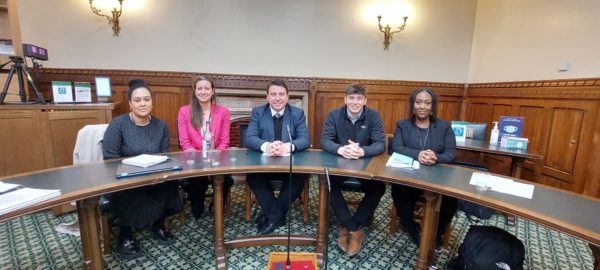On Tuesday the 29th November we were delighted to hold the second meeting of our All-Party Parliamentary Group (APPG) inquiry for Youth Employment in Westminster. The inquiry will examine how mental health is affecting young people accessing the labour market and how they can be supported into good quality work.
Shaun Bailey MP chaired the meeting and invited guest speakers to provide their understanding and experience of ill-mental health and accessing work. It was insightful to hear from guest speakers especially from young people with lived experience, showing that Youth Voice is essential to these discussions.
The guest speakers included two of our amazing Youth Ambassadors Gloria and Euan, who shared their experiences and how mental health has impacted them and their friends. Everyone’s experience with mental health is different but both Youth Ambassadors mentioned how they had felt unsupported in transition periods whether that was from being in school and moving into an apprenticeship or leaving university and entering the workplace.
One of our Youth Ambassadors spoke about their Post-18 choice of wanting to do an apprenticeship but there was a lack of support from their school, which left them feeling like an “outsider.” They went on to say how their “school wanted me to attend one of my Russell Group University options from the UCAS application that I was forced to complete.” This left them feeling unsupported, but also not knowing who to go to or where to turn to for careers advice and guidance on apprenticeships.
Our Youth Ambassadors also spoke about their experience at university and the lack of careers guidance and advice they received. One Youth Ambassador said “It is not accurately communicated to upcoming graduates at university. Instead, the focus is on the grades they achieve whilst at university. However, upon applying for jobs many young people realise that employers are looking for experience.” This demonstrates the need for universities to equip students with tailored careers advice & guidance but also the opportunity for work experience so they feel prepared when trying to access work. The Youth Ambassador went on to explain that “students work very hard over the course of 3 to 6 years to acquire certifications and qualifications in their industry to then be turned away for not having a vast amount of experience.”
Both Youth Ambassadors spoke about their experience of the workplace and needing mental health and well-being support whilst in work. One Youth Ambassador said “I wasn’t fully prepared for the stress and strains of the corporate world especially as an ethnic minority woman entering into the legal industry. I faced a lot of mental stress and shock due to the lack of preparation; this ultimately had an adverse effect on my motivation and energy levels.”
Another Youth Ambassador spoke about how they found their employer supportive when they raised their mental health concerns. They explained how they have “accessed counselling services provided by my workplace and this has been extremely positive for me. It has allowed me to frame thinking and decisions, allowing me to focus daily and I am now at a point where I know I deserve to be where I am despite my preconceptions.”
These experiences as highlighted by our Youth Ambassadors show the importance of an open dialogue around mental health in education and in the workplace. “All young people should have access to such quality aid in whatever path they take.”







